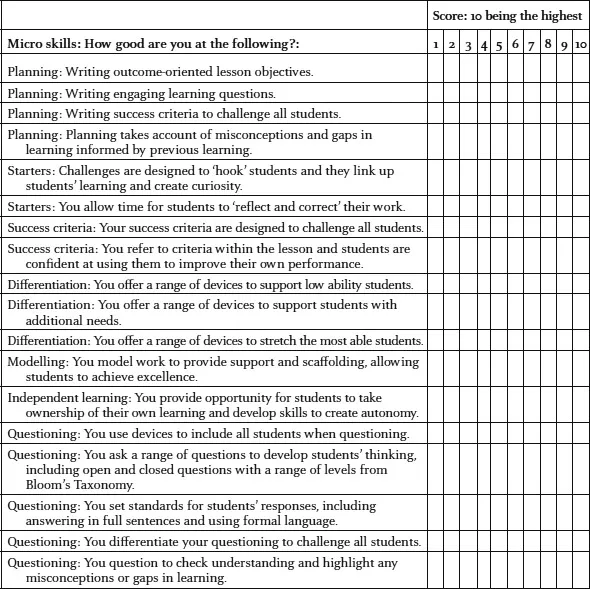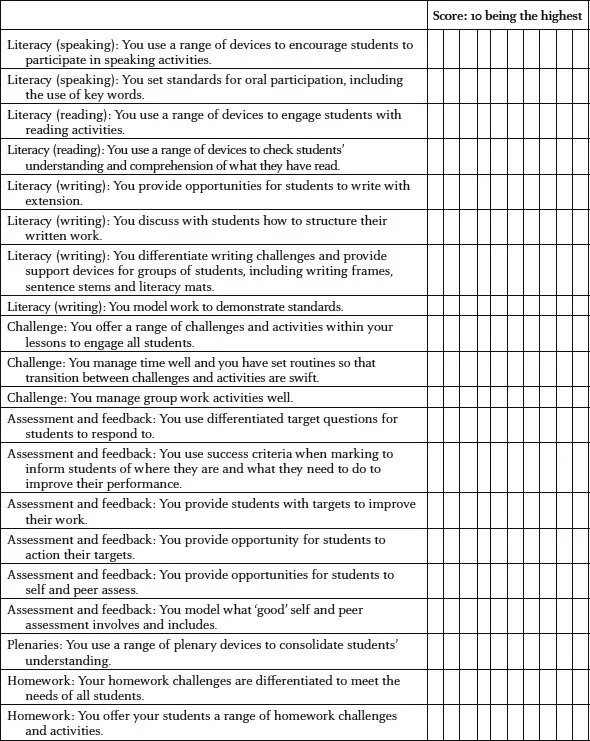![]()
1
How to develop the habits of outstanding teaching
Outstanding teaching is attainable for all teachers. It is not reserved for the lofty few but open for all to achieve. For some it may only require tweaking and developing a few new habits, and for others it may require dedication and a change in mindset to bring about improvements. Whatever the situation you find yourself in, outstanding teaching is not beyond your grasp.
Let us start by considering where you are now in your teaching career and what it is you want to achieve. You may be in one of the following situations:
- New to teaching and keen to develop your teaching practice.
- Teaching for several years and struggling to move your teaching on to the next level.
- Experienced and looking to develop your teaching repertoire further or discover new ideas that enhance your practice.
- Returning to teaching and wanting to update or reinvigorate your teaching practise.
Whatever your personal situation, consider your starting point: Where are you now and what do you want to go on to achieve? To help you review your current position, consider the following question: If you overheard students talking about you in the playground or on the street, what would they be saying about you? Reflect on this for a while. It is a question to get you thinking about how you are perceived as a teacher. Are you the strict teacher, the fun teacher, the clever teacher or the grumpy teacher? Having thought about this question, now consider: How do you want to be remembered by the students in the future? The reality is that you never forget an outstanding teacher. In some cases, it is those outstanding teachers who have inspired us to enter the profession. So, do you want to be an outstanding teacher who inspires or be remembered as Mr/Mrs Grumpy? It’s never too late to change and become the kind of teacher that you dream you can be.
How to coach yourself to outstanding
The good news is that you already possess everything you need to be outstanding: It is all within you. What you have to do is develop your mindset to allow yourself to achieve your ambitions. This idea can be both liberating and scary, but ‘outstanding’ is a state of mind. You may not be outstanding yet because you haven’t decided to be. Once you make the decision to be ‘outstanding’, commit to it. Go to the edge of your comfort zone and see what you can achieve. It cannot be any worse than where you are now, can it?
Teaching can be a strange profession. After one year of training on the job, you are considered expert enough to be left to your own devices and pretty much told to ‘get on with it’. Only when something goes wrong does it necessitate some form of training or support. If you are lucky enough for nothing to go wrong, then you can go merrily on your way, only attending the compulsory training day at the start of the year when the hot topic of conversation is where everybody went on holiday and what you think of the new cakes.
I’m thankful to say that in recent years the culture of training has shifted rapidly. It needs to. This does not mean that training should concentrate on every new pedagogical idea that comes along; rather, it should focus on individualised training programmes to help all teachers to improve their performance in the classroom in order to enable their students to make progress. Regardless of the training/coaching programme that operates at your school, the best approach is for you to take ownership of your own development. Become your own coach and train yourself to peak performance.
Ask yourself the following questions:
- What do outstanding teachers do?
- What do they do differently to you?
- What’s holding you back?
What does outstanding look like?
I believe that outstanding teachers have two key aspects that make them excel: character traits and teaching habits/skills. In many ways, the two are intertwined: for example, outstanding teachers characteristically have strong will power that results in resilience and the ability to build new habits and learn new skills. However, if we dissect these features and strip out complexity, I believe that outstanding teachers can be created. Start by considering the following two questions:
- What are the characteristics of outstanding teachers?
- What do outstanding teachers do that make them outstanding?
Although this list is by no means comprehensive, I assume that the following traits appear on many lists:
Traits of outstanding teachers
- Well organised
- Enthusiastic
- Knowledgeable
- Inspiring
- Positive
- Honest
- Good rapport
In addition to these traits, there are a number of habits that outstanding teachers possess. It is important to recognise that outstanding teachers, whilst being proficient in many of these habits/skills, will not necessarily be outstanding in all areas. In fact, they may only excel in a handful of skills, yet be considered outstanding because they optimise their ‘best’ skills and work to develop those skills they consider less defined. To become outstanding, it is important not to neglect those skills you already possess. In fact, it is vital that you develop and practise those skills to enhance them even more because this is how you become outstanding – not only by learning new skills but also by refining those skills that you consider to already be your greatest assets.
How am I doing?
To help you to identify areas of development as well as those skills you are proficient at, rate yourself against the following micro skills. You may need to familiarise yourself with some skills by referring to the appropriate section/chapter in the book first before you complete the survey. In addition to your self-review, ask other trusted colleagues to rate your skills. I appreciate this can be uncomfortable, but it is important to know that your judgements are correct and know how your teaching is perceived. It may be the case that there are glaring discrepancies between what you think of your teaching and the views of others. You need to reflect on this. Your first response may be that ‘they don’t know what they are talking about’; move beyond this and think carefully about how you deliver that skill. It may become clear that you are going about it in the wrong way. If you really want substantial data to analyse, ask a number of colleagues to complete the form anonymously or even ask students as well.
The list of micro skills aims to break down and deconstruct fundamental components of outstanding teaching. Rather than saying ‘I need to improve my questioning’, which is a large teaching and learning area, it is more beneficial to say ‘I need to improve on engaging all students when questioning’. This is a far more achievable goal and highlights a specific area of development. Once you have mastered this component of questioning, then you can move on work on to another element of teaching practice.
The micro skills sheet should also highlight areas of strength. Exploit these skills: Utilise your existing skills, which have proven to be successful, and get even better at them. Practise and hone these skills further; make yourself an expert of a particular element of teaching practice. Become world class in one particular area and I am confident it will improve your overall teaching practice. Plus, you become the ‘go-to person’ for marking, for example, or the ‘master’ of questioning.
How to be your own teaching coach
Goals
One of the first things you need to develop is total clarity about what you want to achieve. It is not sufficient to simply say ‘I want to be outstanding’; your goals need to be more tangible than that. Be specific in your goals. Write them down in the present tense. These actions will set your mind working on these aims. Try to make your goals measurable so that you can chart your progress and see incremental improvements.
Examples of teaching goals you may set:
- Achieve three ‘outstanding’ lesson observations this year.
- My students achieve an average 8 point score.
- Achieve 100% A* – C grade.
- All of my students make three levels of progress.
For the sake of this exercise, we will use the following goal:
- Achieve three ‘outstanding’ lesson observations this year.
Having set your goals and the time frame you are working in, get to work on planning how you will achieve these goals.
Plan
Having decided on your goal, you need to plan for how you are going to achieve it. ‘Outstanding’ doesn’t just happen; it is the result of small incremental improvements created during practice and instilling successful habits that you first need to identify. To support this process, the coaching sheet in Table 1.2 will help you to document and record your improvements.
Table 1.2 The coaching sheet Goal: Achieve three outstanding lesson observations this year. |
Target area to work on: Questioning |
Micro skill: Ask high level questions to develop students’ thinking |
Feedback/even better if … (EBI): EBI students prioritise their answers rather than giving a general response, so they can develop deeper thinking. |
Scheduled incremental improvement |
Lesson 1 | Lesson 2 | Lesson 3 | Lesson 4 | Lesson 5 |
9A: Use the following question stems: Prioritise … Suggest way to improve … What makes that a good answer? | 7T: Use the following question stems: Prioritise … Which answer did you like best? | PLANNING LESSON | 11S: Use the following question stems: Prioritise … How could we solve …? What makes that a good answer? | 8A: Use the following question stems: Prioritise … Give me an answer with the word metaphor in it. |
Feedback: What went well (WWW): |
Feedback: Even better if … (EBI): |
Goal: The overall goal you are going to achieve written in the present tense.
Target area to work on: The larger teaching component that you have highlighted to address.
Micro skill: This is the smaller element of the teaching...



